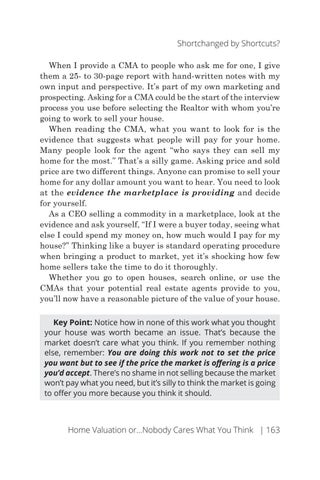Shortchanged by Shortcuts? When I provide a CMA to people who ask me for one, I give them a 25- to 30-page report with hand-written notes with my own input and perspective. It’s part of my own marketing and prospecting. Asking for a CMA could be the start of the interview process you use before selecting the Realtor with whom you’re going to work to sell your house. When reading the CMA, what you want to look for is the evidence that suggests what people will pay for your home. Many people look for the agent “who says they can sell my home for the most.” That’s a silly game. Asking price and sold price are two different things. Anyone can promise to sell your home for any dollar amount you want to hear. You need to look at the evidence the marketplace is providing and decide for yourself. As a CEO selling a commodity in a marketplace, look at the evidence and ask yourself, “If I were a buyer today, seeing what else I could spend my money on, how much would I pay for my house?” Thinking like a buyer is standard operating procedure when bringing a product to market, yet it’s shocking how few home sellers take the time to do it thoroughly. Whether you go to open houses, search online, or use the CMAs that your potential real estate agents provide to you, you’ll now have a reasonable picture of the value of your house. Key Point: Notice how in none of this work what you thought your house was worth became an issue. That’s because the market doesn’t care what you think. If you remember nothing else, remember: You are doing this work not to set the price you want but to see if the price the market is offering is a price you’d accept. There’s no shame in not selling because the market won’t pay what you need, but it’s silly to think the market is going to offer you more because you think it should.
Home Valuation or…Nobody Cares What You Think | 163




